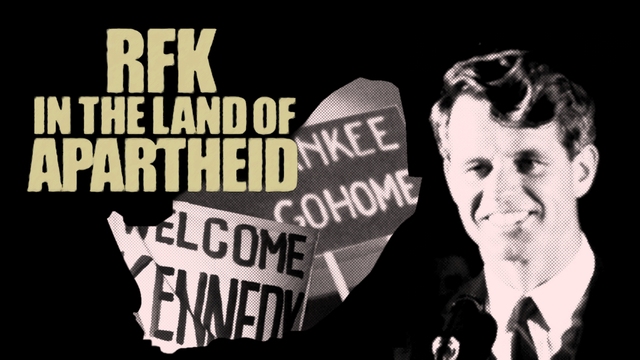Using never-before-seen archival footage, this beautifully produced documentary brings one of history's most inspiring chapters to life. This is the previously untold story of Robert Kennedy's visit to South Africa at the height of Apartheid.
"For Robert Kennedy to go there, was an enormous statement. It was the first time anyone had gone to Soweto and said 'you're a human being'". Whilst the Cold War ideology of anti-communism gripped America, a Junior US Senator stood on top of a moving car in Soweto, without security, and shaking hands with the crowds of people that followed him wherever he went. No white person had ever received such a greeting in South Africa. A journalist at the time wrote:
"He made us feel, more than ever, that it was still worthwhile, despite our great difficulties, for us to fight for the things that we believed in".
"That is our only philosophy - anti-communism? I think we stand for something. I think we stand for something positive." Kennedy's radical words in his famous 'Ripple of Hope' speech in Cape Town, were met with rapturous applause. For many Americans, the reports coming out of South Africa in the 1960's seemed hauntingly similar to the Civil Rights Movement in America. Kennedy showed not only that the world hadn't turned their back on South Africa, but that an end to racism was possible.
"Your message shows clearly that the world has forever turned its back on racial discrimination, and that the South African Government's blind worship of race theories is a pathetic and tragic defiance of the realities of the Twentieth Century".
Kennedy risked everything by meeting and forming a friendship with Chief Luthuli - one of Africa's great leaders, forced into exile by the 'Supression of Communism Act', he speaks candidly with Kennedy in rare archive:
"I feel that Africa is my continent and I must free Africa". By the last night of his visit, Kennedy had begun to have a political impact in South Africa beyond the Black majority and the white liberal universities. He spoke with Afrikaans students at the pro-apartheid University of Stellenbosch, boldly challenging them:
"Suppose God is black?".
The legacy of his words and actions can be felt even today, in the legion of black South Africans who declare proudly:
"My name is Kennedy". Together with the activities of various other American individuals and organisations working to mobilise American opinion about the situation in South Africa in the Sixties, Senator Kennedy's visit helped to plant seeds -for what was to take another two and a half long decades to bare fruit. In the context of the Unites States activities in Africa in the 1960s, this previously untold chapter will go down as one of the West's most positive contributions.
LEARN MORE.
WATCH MORE.
JOIN THE DISCUSSION.
www.rfksafilm.org/html/about.php"
 Using never-before-seen archival footage, this beautifully produced documentary brings one of history's most inspiring chapters to life. This is the previously untold story of Robert Kennedy's visit to South Africa at the height of Apartheid.
Using never-before-seen archival footage, this beautifully produced documentary brings one of history's most inspiring chapters to life. This is the previously untold story of Robert Kennedy's visit to South Africa at the height of Apartheid.




